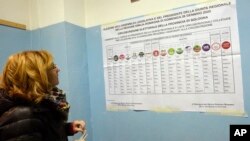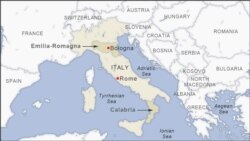Right-wing opposition leader Matteo Salvini is telling Italians who are voting in two regions to use their ballots to help his anti-migrant party return to national power.
Voting began Sunday morning in Emilia-Romagna, a northern region where the left-wing has held power for decades, and in Calabria, in the south, an area Salvini's League party once disparaged as unproductive but where it now wants to expand a foothold .
Results, expected early Monday, of the voting for governor and regional legislatures could rock Italy's squabbling central government in Rome.
Salvini is demanding an early election to end Premier Giuseppe Conte's coalition government, whose junior partner is the center-left Democrats. If the Democratic Party's incumbent governor in Emilia-Romagna loses to the League's candidate on Sunday, the bickering among Conte's coalition partners could worsen and jeopardize the nearly 5-month-old government's survival.
The senior party in Conte's government is the populist 5-Star Movement, which itself is so plagued by infighting and defections that its political leader resigned his post last week.
Salvini in a Facebook post urged Italians as they headed to vote Sunday to "liberate these splendid regions" from the Democrats and "Let's free the entire country."
Salvini, who in Conte's previous government took a hard line against immigration, lost his role as deputy premier and interior minister last year and his right-wing party lost its place in government when he yanked his support from Conte in a failed bid for an early election that Salvini had hoped with make him premier.
Conte then formed a new government with the Democrats, who set aside their deep rivalries with the 5-Stars to replace the League in the national coalition.
Voters could be forgiven if they had the impression Salvini himself was running to be governor of Emilia-Romagna. The League leader campaigned practically daily in the region, especially in the countryside and small towns, considered ripe for a shift toward the right. With his "Italians first" mantra, Salvini dashed from rally to rally, sampling local agricultural products in the region, which is one of Italy's wealthiest and most productive. He boasted of how, when he was interior minister, fewer migrants, trafficked by Libya-based smugglers, arrived in Italy aboard charity rescue boats.
Opinion polls during the campaign indicated the race for governorship was neck-to-neck.
The League's candidate is Lucia Borgonzoni, a League politician who as undersecretary for culture in Conte's first government distinguished herself mainly for complaining that the Louvre in Paris was getting too many loans of Leonardo da Vinci's artworks for an exhibition to mark the 500th anniversary of the Italian Renaissance master's death.
The Democrats' candidate is Gov. Stefano Bonacconi, under whose leadership the region's reputation for a well-run health care system and other local services was reinforced.
But Salvini is banking on voters in Emilia-Romagna viewing Sunday's ballot as a referendum on Conte's government and a chance to boost his League's fortunes. The right-wing League has consistently scored as Italy's most popular party nationwide in recent opinion polls.
Conte says the outcome of Sunday's votes won't affect his determination to continue governing until the next election for Parliament is due in 2023.
Until recent years, the League's profile was as a northern-based political power, with its leaders depicting the underdeveloped south as a parasitic drain on taxpayers' money.
But Salvini revamped the image of the League, which had long been called the Northern League, into a nationwide force with rhetoric that blames migrants for crime and the European Union for what he says is infringement on Italy's sovereignty.
His chief ally, the Brothers of Italy, has its roots in neo-fascism and is growing quickly in popularity.





